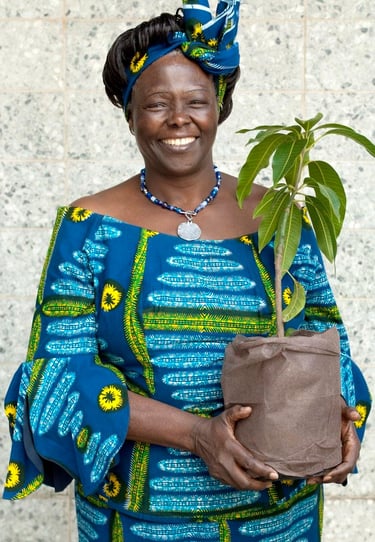Remembering Wangarĩ Maathai
At the core of a magnanimous personality like herself, she forever was and shall always be in our minds, a loving woman giving back to the mother who raised us all.


While cleaning out my desk and my closet in preparation for my upcoming freshman year at college, I stumbled upon some of my old English textbooks that I had saved, intending to donate them before I set off on my university journey. As I flipped through my books one last time before finding them a new home, I was bombarded with uncountable memories of my middle school days filled with incessant chatter and irreplaceable memories.
That was until I came across a particular chapter in my 8th Grade English textbook that held within itself the biography of a woman, whose story I credit with changing my entire perspective about feminist and environmental activism within its four-page long length, and someone whom I wish to give a tribute to once again.
Wangarĩ Maathai (1940-2011) was a Kenyan social, political, and environmental activist and an elected member of the Kenyan parliament. Someone with an irreplaceable amount of love for Mother Earth, she was most famously the founder of the Green Belt Movement, and for her efforts in the preservation of nature was also awarded the Nobel Peace Prize in 2004. Growing up during the peak years of the Mau Mau insurgency, Miss Maathai never let her political or socio-cultural environment ever deter her from being an exceptionally bright student, even being selected as one of the 300 Kenyans taking part in the much coveted Kennedy Airlift in 1960. Additionally, in 1971, she became the first Eastern African woman to receive a Ph.D., her doctorate in veterinary anatomy, from the University College of Nairobi.


Despite multiple academic degrees and achievements under her belt, Miss Maathai still attested to facing many instances of tribal and sexist discrimination, being passed up for opportunities that she was well-qualified simply because of her background. However, she never let those instances deter her from creating her own path whenever she set out to create one, dedicating her whole life to fighting for equal opportunities for women in the workplace.
It was in the late 1960s in Pittsburgh that Miss Maathai, then a Master of Sciences student at the University of Pittsburgh, received her first taste of environmental activism; this would later burn within her a fire to forever use her voice to fight for environmental conservation, with her using her husband’s eventual election into the parliament as an opportunity to create her own ecological conservation projects and shed a light unto the issues she so passionately believed in.
Later in 1977, Miss Maathai officially started her Green Belt Movement under the National Council of Women of Kenya (NCWK), aiming to use this initiative to not only combat the rising deforestation in their country at a grassroots level but to also bring attention to other female activists. Nearly fifty years since, this movement has become one of the most renowned global movements around the ground and has been immensely successful in its aim to breathe life again into the environment, having planted 30 million trees (and counting!) across Kenya. In 2004, her work was internationally recognized with the Nobel Peace Prize.
Above all her efforts against the government to fight for nature and her many rallies in support of afforestation, what I find to be the most inspirational thing about Miss Maathai is how at the core of a magnanimous personality like herself, she forever was and shall always be in our minds, a loving woman giving back to the mother who raised us all.
Bibliography:
https://www.greenbeltmovement.org
Photo courtesy of Patrick Wallet
Photo courtesy of Alexander Mils/Unsplash
